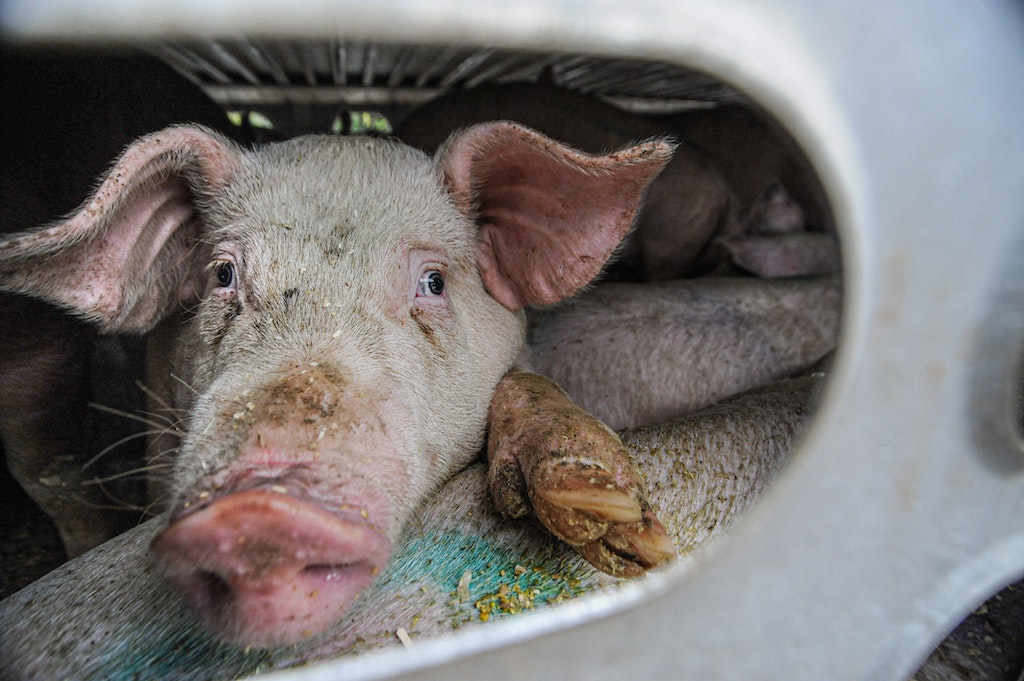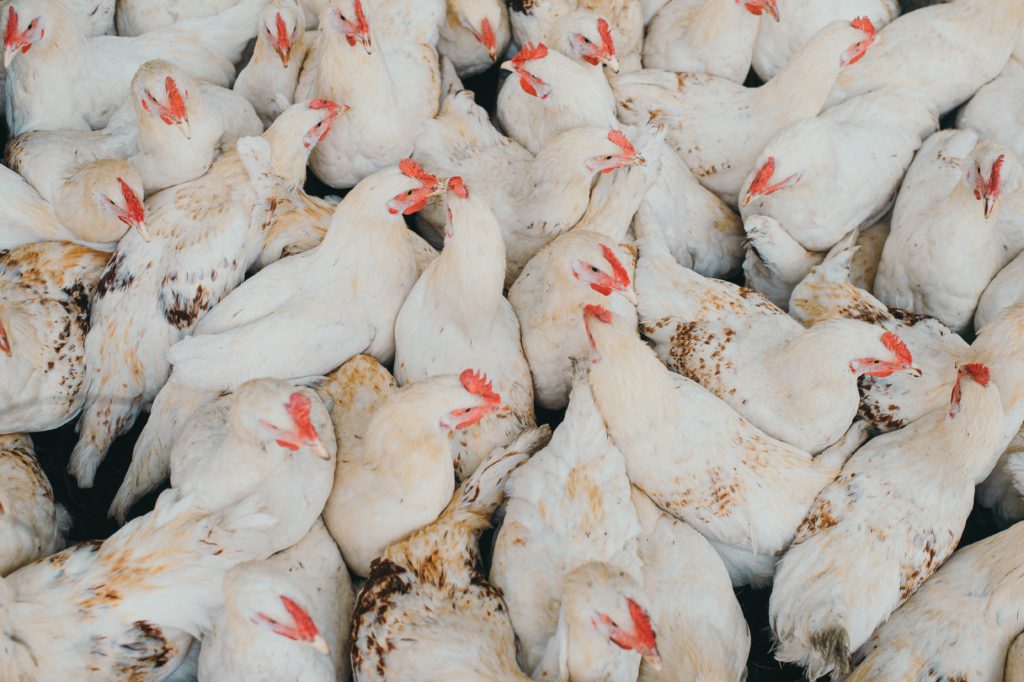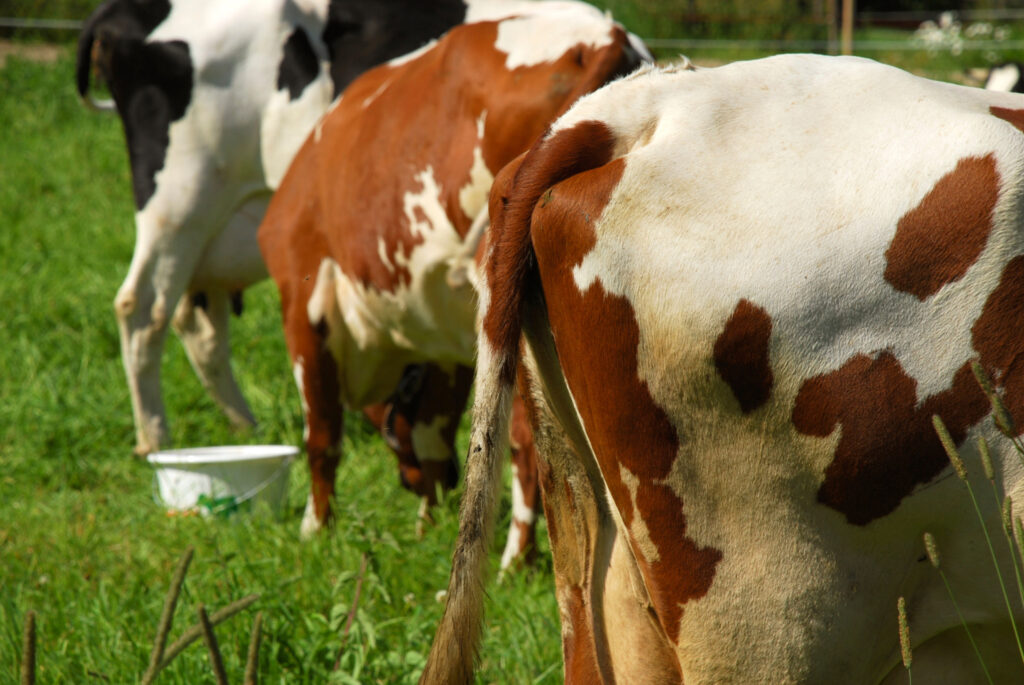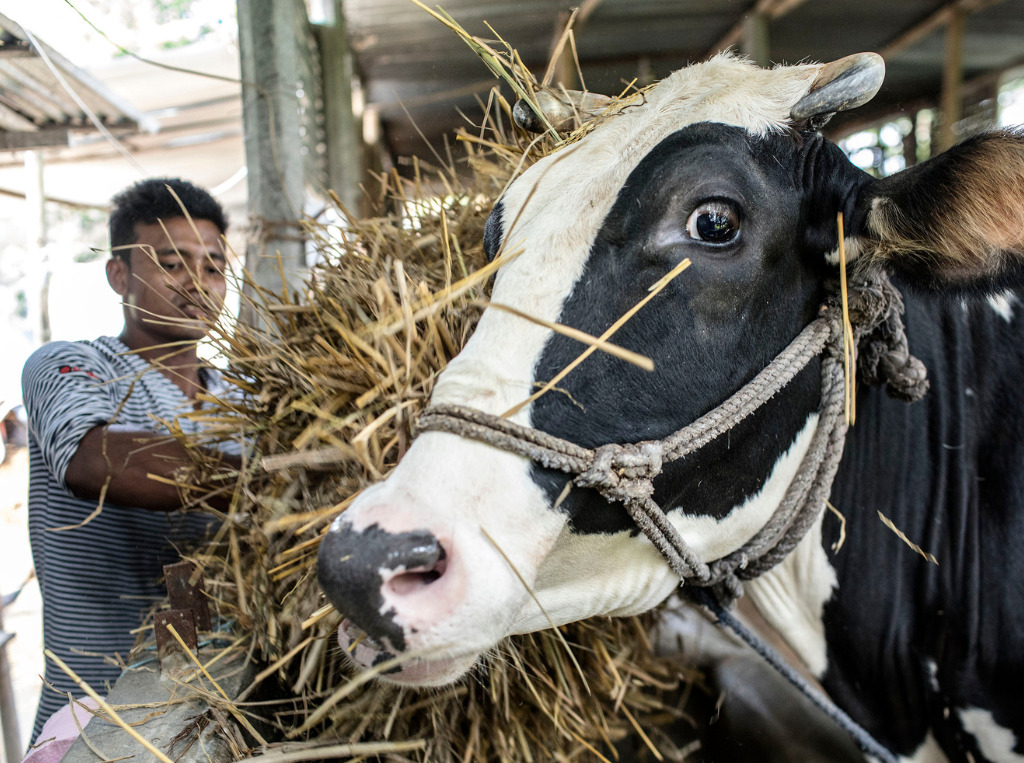Meat & Dairy Lobby Pressured UN Body to Censor Work on Livestock Farming Methane Emissions: Report
7 Mins Read
Former officials at the UN Food and Agriculture Organization (FAO) said they were censored and undermined by the body when reporting on the methane emissions caused by the animal agriculture industry, owing to pressure from the livestock lobby, reports the Guardian.
Ex-members of the FAO allege that they were “censored, sabotaged, undermined and victimised” for a decade after reporting on the hugely detrimental effect of livestock farming on methane emissions. In 2006, the FAO published a report called Livestock’s Long Shadow, a landmark study highlighting the first calculations of the environmental cost of the meat and dairy sectors.
The report outlined that livestock farming was responsible for 18% of global greenhouse gas emissions. This estimate included 9% of all carbon emissions due to deforestation and feed crops, 37% of methane emissions, largely from cow burps, 65% of nitrous oxides from manure, and 64% of ammonia emissions (all anthropogenic).
The publication was damning, receiving praise from environmental quarters and swift backlash from the meat and dairy industry. Some of the people who worked on that report told the Guardian how this led to an internal clampdown by leaders at the FAO, which was long seen as an ally by the animal lobby.
Henning Steinfeld, head of the FAO’s livestock analysis unit, recalled hearing that “the FAO has fallen into the hands of vegan activists” and receiving personal threats like “the anti-livestock people are a pest that needs to be eradicated”.
An ex-member added that “lobbyists obviously managed to influence things”. “They had a strong impact on the way things were done at the FAO and there was a lot of censorship,” they explained. “It was always an uphill struggle getting the documents you produced past the office for corporate communications and one had to fend off a good deal of editorial vandalism.”

Backlash from countries and industry
Between 2006 and 2019, both current and former FAO experts said management had made several attempts to suppress investigations linking cows to climate change. But the pressure wasn’t just internal – the FAO was facing the force of large meat producers like Brazil, Argentina, Uruguay, Paraguay, Australia and the US, which complained to leadership, while there were also protests from “the private sector, the large-scale meat, feed and dairy producers”, according to Steinfeld.
Meanwhile, there were negative reactions from media outlets including the BBC, the Telegraph and CNN, who criticised an error made by the report in its calculations. The paper alleged that livestock’s impact on global warming was “an even larger contribution than the transportation sector worldwide”, which one of the authors called a “slight methodological error” only inserted on request from the FAO press office, which wanted to hype up the report.
One source told the Guardian they were reprimanded for prepping Meatless Monday leaflets for the cafeteria during an FAO food security summit with heads of state in 2008. “Remove and destroy them,” a senior FAO executive told them. “These will not be put in people’s trays.”
A year later, another FAO report called Livestock in the Balance was delayed for months because the FAO hierarchy tried to dilute references to the harm caused by the animal agriculture industry and rewrote key passages without consulting the authors. This led to what Steinfeld called an internal “mini-revolution”, with about a dozen staffers withdrawing their names from the report in protest.
Even if livestock contributes 18% to climate change, the FAO shall not say that,” he recalled being told by a senior. “It’s not in the interest of the FAO to highlight environmental impacts.”
The paper was seen as problematic and the director general’s office wanted to tone down its messages, said a former staffer. “The issue was [the report] presenting statements that livestock was not hunky dory. The response was, therefore, censorship.” Another ex-researcher added: “There was substantial pressure internally and there were consequences for permanent staff who worked on this, in terms of their careers. It wasn’t really a healthy environment to work in.”

Livestock alliances and fluctuating emissions estimates
In addition, Steinfeld said that diplomats and meat industry lobbyists talked to senior FAO leaders to encourage them to not invest in work dealing with climate impacts. Meanwhile, an umbrella organisation, the Global Agenda for Sustainable Livestock was set up to bring together NGOs, scientists, governments and stakeholders to focus on the issue.
But this was undermined by FAO leadership, which suffered from “a lot of incompetence and ignorance” and “actually did not understand different greenhouse gases and sources of emissions” at senior levels, according to Steinfeld. The hierarchy tried to “obstruct and torpedo our effort”, he added, citing how when a Latin-American minister flew to Rome for talks with the group, they were picked up by a senior FAO official and changed their mind about the meeting by the time they reached the headquarters.
At the same time, a rival organisation called the Livestock Global Alliance (LGA) was set up by the livestock lobby to enhance the image of the sector after the Livestock’s Long Shadow report. One former FAO member said LGA aimed to get funding for industry-friendly research that would feed back into the FAO’s policy-making processes and influence scientific consensus.
“Private companies wanted to finance the science to achieve more outcomes that were biased in the direction they wanted, and this happened,” they said. “All of a sudden, the trickle of scientific studies going in the livestock industry’s direction exploded.”
Steinfeld attended some of the meetings too. “They discussed world domination,” he recalled. “They discussed how everything could be brought into their fold and establish the World Bank and World Organisation for Animal Health as the true world guardians of livestock and everything else should disappear.”
Additionally, there are concerns from scientists about the continued decline of the FAO’s estimate of livestock agriculture’s overall emissions. The 18% figure was changed to 14.5% in a follow-up paper in 2013, and is now cited as 11.2% based on a new GLEAM 3.0 model. But these numbers have been disputed by other recent studies, which put the emissions contributions to 20% or between 16.5-28.1%. Another paper explained that the FAO’s use of modelling over verifiable monitoring data could underestimate livestock methane emissions by up to 90% in countries like the US.
“Livestock is part of the FAO’s strategy on climate change and we work with governments and farmers and industry on this programme as well,” Anne Mottet, the FAO’s livestock development officer, told the Guardian. “We can’t ignore the main actors of the sector but there has been no particular pressure from them.”

Animal lobby censorship is a wider problem in the UN
FAO data was a prime source for the latest report on forestry and agriculture by the UN International Panel on Climate Change (IPCC), according to lead author Gert Jan Nabuurs. The FAO’s alleged censorship mirrors a similar development with the IPCC. In its third assessment report last year, the climate body suggested that shifting to plant-based diets (alongside other alt-protein) could result in a “substantial reduction in direct greenhouse gas emissions from food production” – and this didn’t need to be a fully vegan lifestyle,
However, in a leaked draft of the original sixth report earlier this year, the authors initially recommended a shift towards plant-based diets – before the wording was softened in the final version. The original line read: “Plant-based diets can reduce GHG emissions by up to 50% compared to the average emission-intensive Western diet,” but this was changed to a recommendation of “balanced, sustainable healthy diets acknowledging nutritional needs” after pressure from delegates from Argentina and Brazil.
It also points to a larger issue within the UN, whose climate summit has infamously lacked a focus on food and animal agriculture, despite the mounting evidence about the industry’s effect on the climate crisis. The food industry is responsible for a third of all anthropogenic emissions, according to a 2021 report. Another 2021 study revealed that meat accounts for nearly 60% of all emissions from food, while separate research has shown that animal-derived foods like meat and dairy cause twice as many emissions as plant-based foods.
But while 2021’s COP26 summit in Glasgow saw the UN introduce climate labels to the meat-heavy food menu, it failed to add food and livestock farming to the agenda. And last year, the annual conference in Egypt hosted its first-ever pavilions dedicated to food system changes but still didn’t reference livestock reduction.
Starting next month, the Dubai-hosted COP28 is touted to be the first ‘food-focused’ UN climate conference, with a predominantly vegan catering menu. And amidst all the allegations by its own members, the FAO will present a blueprint outlining how food systems must change to limit global temperature rises to 1.5°C above pre-industrial levels. It will likely have to answer some more uncomfortable questions.
This article is part of our Meat Misinformation Miniseries, in which we feature investigations that shed light on how the animal ag industry is using its influence to alter food policy regulations.




